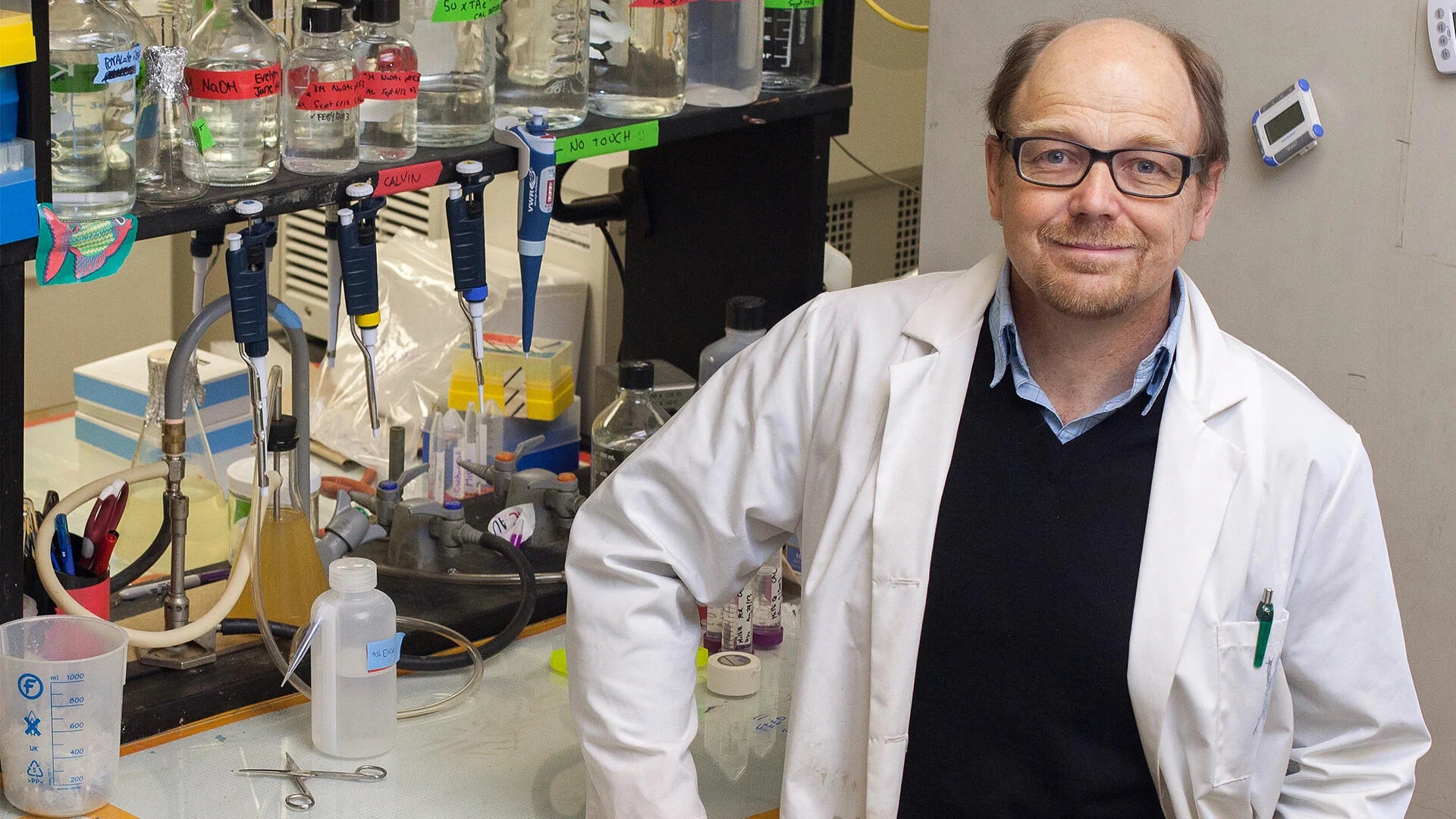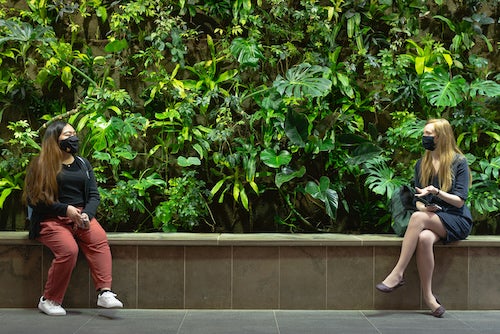Editor:
Brandon Sweet
University Communications
bulletin@uwaterloo.ca
President, University leaders engage on anti-racism
President Feridun Hamdullahpur and other senior administrators have been meeting with students, faculty and staff to listen and gather feedback on the University’s anti-racism activities.
“These have been productive meetings that are helping shape my understanding of how the University needs to move ahead,” President Hamdullahpur wrote in an update distributed to the University’s Executive Council last Friday. “I will admit, we are all challenged to ensure that we take the right steps and create the right conditions for our campus to actively tackle racism in all its forms.” This work, says Hamdullahpur, “must involve the leadership, advice and reflections of people with lived experiences of racism.”
President Hamdullahpur has asked Charmaine Dean, vice-president, research and international, to help lead a consultative approach to listening to individuals and groups on campus. “Over the next several weeks, we will all continue to consult broadly so we can establish the right actions that will allow us to challenge the systemic and structural barriers that Black, Indigenous and People of Colour (BIPOC) face at Waterloo,” Hamdullahpur writes.
“Many people across campus have been in touch with us to share their experiences and keenness to participate in our progress,” the president’s update continues. “We are still hearing from these people on how they would like to shape the discussion moving forward. This means we cannot yet say what the end will look like, rather we will be helping this team of staff, faculty members and students create solutions together.”
President Hamdullahpur has committed that leaders will continue meeting with individuals and groups to listen to their feedback on how the University will work to address racism, anti-Black racism and anti-Indigenous racism on campus, consolidate that feedback and use it to create meaningful action.
The tell-tale sign of antibodies

By Elizabeth Kleisath. This article was originally published on Waterloo Stories.
When the University’s research labs shut down for quarantine, biology professor Brian Dixon pivoted some of his research away from blood testing in fish, into looking at blood testing in humans. Instead of sitting around and waiting for his labs to open again, Dixon wanted to use his time and knowledge of biology and immunology to contribute to the global need for understanding and overcoming COVID-19.
“My lab happens to do a lot of testing in fish because aquaculture is important — but it’s all blood testing, it’s all looking for molecules in blood,” Dixon explains. “So, we realized that it would be very easy for us to pivot to testing for COVID-19.”
Dixon and his lab are exploring ways to test blood samples for antibody markers, which indicate if someone has previously been exposed to COVID-19. Antibody testing is becoming more important as quarantine restrictions are softened, because it gives an indication of an individual’s immunity to COVID-19, as well as how long the immunity lasts, therefore indicating who may be at a greater risk for infection.
Dixon goes on to explain that when a body is infected with a virus, the immune system creates molecules known as antibodies.
“Antibodies function similar to a lock and key, because each antibody is specifically designed by our bodies to identify one specific virus — such as SARS-Cov-2, the virus that causes the illness COVID-19 — and bind to it,” he says. “Once created, these antibodies then stay in our blood stream, ready to identify and defend against the virus in the future.”
By creating a test for COVID-specific antibodies, scientists can identify individuals who have already been exposed to a virus and therefore might be more immune.
Infection causing viruses, including COVID-19, produce two different types of antibodies — one about four days after the initial infection and the other about 14 days later. Identifying which antibodies someone produces indicates how recent a COVID-19 infection is, and if someone has already been exposed to and are now protected from the virus.
Working in collaboration with Marc Aucoin from the Faculty of Engineering, Dixon is using a standard biochemical test known as an ELISA (enzyme-linked immunosorbent assay) which can detect these two types of antibodies. Dixon is using ELISA to answer questions about how long the antibodies last in our bodies and how dilute the blood samples can be while still reliably detecting antibodies.
“The results of the first samples we have tested match perfectly with the known COVID-19 infection status of the patients, including a weaker antibody presence in patients who did not have a strong, definitive COVID-19 infection,” Dixon says. “Therefore, we are confident in the antibody test’s ability to accurately predict the presence and strength of a patient’s antibody response.”
Additionally, he and Aucoin plan to expand the research to look at how mutations in the virus could change the body’s immune response, and also investigate if there is a correlation between the amount of antibodies an individual produces and their outcome to COVID-19. They also have plans to research stimulating antibody production from artificial viruses that look similar to the SARS-Cov-2 virus but can’t replicate, which could be used in developing a potential vaccine.
Get involved with planning International Week at Waterloo

A message from Waterloo International.
The University of Waterloo is excited to celebrate International Week from September 21-25, 2020.
International Week is a great opportunity to recognize and promote the value of education abroad, while bringing global conversations to campus. This signature event will showcase the merits to international education through a variety of programmes, events, collaborations, debates, discussions, and an array of activities for the University of Waterloo community.
Please join us in celebrating our international students, staff and faculty at home and let’s experience the world together.
Would you like to host an event for International Week? Please contact Aisha Shibli for the chance to represent your unit. It is our hope to make this truly a campus-wide endeavor. The deadline to submit expressions of interest is August 14, 2020.
For more information on International Week, visit the Waterloo International – International Week webpage.
Mandatory mask reminder and other notes

This is a reminder that face coverings are required in common indoor spaces on campus.
Effective Monday, July 27, all employees, students, visitors and contractors are required to wear a face covering in common use areas of University buildings. This includes corridors, lobbies, washrooms, elevators, classrooms, teaching laboratories and meeting rooms, or in any area where physical distancing is a challenge. In employees-only areas, managers will set the expectation with their teams based on physical setup and work activities.
A face covering can be a medical or non-medical mask or other covering, including a bandana, scarf or other fabric that covers the nose, mouth and chin to create a barrier to limit the transmission of respiratory droplets. Learn more on the face coverings website.
If you have questions, please contact safety@uwaterloo.ca.

Members of the University community are invited to join the University of Waterloo in partnership with the Kitchener Public Library for an online community lecture entitled "Will our kids be alright?"
"How will the disruptions of 2020 affect our children and their development?" says the lecture's promotional mateiral. "University of Waterloo researchers will unpack the short and long-term social and developmental consequences and how we can avoid exacerbating the effects of the global pandemic."
Speakers include:
- Janice Aurini, professor, Department of Sociology;
- Dillon Browne, professor, Department of Psychology;
- Kristina Llewellyn, associate professor, Department of Social Development Studies, Renison University College; and
- Sheila Ager, dean, Faculty of Arts (panel moderator).
The event takes place on Tuesday, August 25 online from 7:00 p.m. to 8:00 p.m. To register and learn more about the event, visit the Community Relations and Events website.
Link of the day
When and Where to get support
Students can visit the Student Success Office online for supports including academic development, international student resources, leadership development, exchange and study abroad, and opportunities to get involved.
Instructors can visit the Keep Learning website to get support on adapting their teaching and learning plans for an online environment. The following workshops are current offerings from the KL team (CTE, CEL, ITMS, LIB):
Getting Ready to Facilitate Online Courses: TA Training, beginning July 13.
Remote Course Design Essentials, Wednesday August 5, 8:30 a.m. to Tuesday, August 11, 4:30 p.m.
Assessment Design Café, Thursday, August 13, 1:30 p.m.
Employees can access resources to help them work remotely, including managing University records and privacy of personal information
Interested in learning more about engaging your students in an online course? The Centre for Extended Learning has created a new resource for you called "Fostering Engagement: Facilitating Online Courses in Higher Education"
ThisOpen Educational Resource was designed for post-secondary instructors and teaching assistants who would like to better understand the critical role of facilitation in online course delivery, and build practical skills and strategies that are relevant, effective, and authentic.
Here are some tips for staying healthy while working from home.
The Writing and Communication Centre has gone virtual. We have many online services to help you meet your goals, including: Virtual Pre-booked and Drop-in appointments, Online workshops, Virtual Grad and Faculty Writing Cafés, Instagram Live Q&A sessions, Live PJ-Friendly Write-ins, Online learning resources, and Online programming for Master’s and PhD students. Whatever you’re working on, we’re here to help! Visit our website for more information.
We understand that these circumstances can be troubling, and you may need to speak with someone for emotional support. Good2Talk is a post-secondary student helpline based in Ontario, Canada that is available to all students.
If you feel overwhelmed or anxious and need to talk to somebody, please contact the University’s Campus Wellness services, either Health Services or Counselling Services. You can also contact the University's Centre for Mental Health Research and Treatment.
The Library has published a resource guide on how to avoid information overload.
The Faculty Association of the University of Waterloo (FAUW) continues to advocate for its members. Check out the FAUW blog for more information.
The University of Waterloo Staff Association (UWSA) continues to advocate for its members. Check out the UWSA blog for more information.
WUSA supports for students:
Food Support Service food hampers are currently available from the Turnkey Desk on weekdays from 9:00 a.m. to 4:00 p.m. in the Student Life Centre. If you have any questions please email us at foodsupport@wusa.ca.
MATES – Providing general online Peer Support via Skype to undergraduate students. To set up an appointment, please go to: https://wusa.ca/peersupport
Glow Centre - Providing online Peer Support for the LGBTQ2+ community via Skype to Undergraduate students. To set up an appointment, please go to: https://wusa.ca/peersupport
The Women’s Centre– Providing online Peer Support via Skype to undergraduate students. To set up an appointment, please go to: https://wusa.ca/peersupport
RAISE– Providing online Peer Support via Google to undergraduate students. To set up an appointment, please go to: https://wusa.ca/peersupport
The Bike Centre – Now open by appointment for your bicycle repair and rental needs in the Student Life Centre. For more information or to schedule an appointment, please go to: https://wusa.ca/bikecentre
Centre for Academic Policy Support - CAPS is here to assist Waterloo undergraduates throughout their experience in navigating academic policy in the instances of filing petitions, grievances and appeals. Please contact them at caps@wusa.ca. More information at http://wusa.ca/caps
WUSA Commissioners who can help in a variety of areas that students may be experiencing during this time:
- Equity – equity@wusa.ca
- Co-op and Experiential Affairs – coop.affairs@wusa.ca
WUSA Student Legal Protection Program- Seeking legal counsel can be intimidating, especially if it’s your first time facing a legal issue. The legal assistance helpline provides quick access to legal advice in any area of law, including criminal. Just call 1-833-202-4571.
Empower Me is a confidential mental health and wellness service that connects students with qualified counsellors 24/7. They can be reached at 1-844-741-6389.
When and Where (but mostly when)
Healthy Warriors at Home. Free programming including Online Fitness, Personal Training, Health Webinars, Personalized Nutrition and more. Open to students, staff, faculty and alumni. Register today.
Waterloo Warriors Online Hockey Skills Camps. Designed to provide a fun, inclusive and safe atmosphere where youth can take part in skill development and team building. Age 7-9 and 10-12. Only $50/week and includes 5 x 1 hour sessions. Register today.
Warriors Basketball Web Workouts. Register today to gain access to online content that is guaranteed to help you improve your basketball skills; regardless of your current skill level. Open to all ages. New content added weekly throughout the year for only $100. Register today.
Warriors Big 6 Summer Challenge. Weekly challenges from July 13 to August 23 focusing on Movement, Sleep, Hydration, Nutrition, Apps and Choose your own adventure. Post your photo and tag @WlooRec on Instagram for a chance to win a $100 box from truLOCAL each week as well as $100 from Mel’s Diner for our grand prize winner. Stay healthy Warriors!
New Faculty Online Social, Tuesday, August 11, 11:00 a.m.
NEW - Astronomy At Home viewing event, Tuesday, August 11, 8:30 p.m.
Science Innovation Hub Skills Development Workshop: Scientific Project Planning, Wednesday, August 12, 3:00 p.m.
Engineering Our Way Through a Pandemic: How Waterloo Engineers are Finding Solutions, Thursday, August 13, 1:00 p.m. Part of the Engineering Alumni Speaker Series, this virtual event is open to everyone. A Zoom link will be sent to registrants.
CBB-[CREATE Series]- Engagement with the FDA on Premarket Submissions and Inspections by Yuan Fang], Friday, August 14, 2:00 p.m. to 3:00 p.m. Online via Webex.
QPR Mental Health Training for Students, Monday, August 17, 1:30 p.m., Microsoft Teams – Register on GoSignMeUp.
Waterloo Innovation Summit, Wednesday, August 19, 9:00 a.m.
A conversation about Indigenizing annual performance reviews, Wednesday, August 19, 1:00 p.m. Register for access.